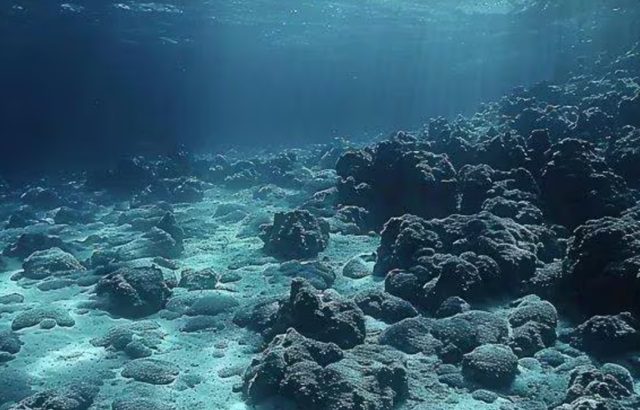BTN News: Oxygen is the lifeblood of our planet, produced by plants and algae through photosynthesis, using carbon dioxide and sunlight. This elemental process has long been understood as the cornerstone of life on Earth. Yet, a groundbreaking study published in Nature Geoscience reveals a startling discovery that could redefine our understanding of oxygen production and the origins of life. Scientists have uncovered “dark oxygen” emissions from metallic minerals deep in the ocean, suggesting that oxygen can be created without sunlight. This revelation not only challenges conventional wisdom but also opens new avenues for exploring how life might have begun on our planet.
An Astonishing Find
Researchers investigating the ocean floor in the Pacific Ocean’s Clarion-Clipperton Zone made an extraordinary discovery. They found polymetallic nodules—metal-rich deposits that spontaneously emit oxygen in the dark depths of the ocean, far from any sunlight needed for photosynthesis. These nodules, scattered across vast areas, were found to produce oxygen continuously. This phenomenon was observed through underwater cameras placed more than 4,000 meters deep, which recorded increased oxygen levels over several days. Initially, scientists suspected instrument errors, but repeated observations confirmed the presence of these natural oxygen-producing batteries.
A Paradigm Shift in Understanding Oxygen Production
This discovery marks the first time oxygen production has been observed without the involvement of photosynthetic organisms. “When we first obtained these data, we thought the sensors were faulty,” said Andrew Sweetman, professor and head of the deep-sea ecology and biogeochemistry research group at the Scottish Association for Marine Science (SAMS). “Every study conducted in the deep sea had only seen oxygen consumption, not production.” The persistence of these unexpected results led Sweetman and his team to realize they had stumbled upon something groundbreaking.
The Mechanics of “Geobatteries”
The polymetallic nodules, roughly the size of potatoes, consist of rare earth metals such as cobalt, manganese, and nickel. These nodules have long been eyed by mining companies as potential sources of valuable metals for batteries and electronics. However, their newfound ability to function as natural batteries in the ocean depths adds a fascinating dimension to their significance. The nodules were found to generate voltages of up to 0.95 V, and when grouped, they can achieve the 1.5 V required for the electrolysis reaction that splits water to produce oxygen.
Implications for the Origins of Life
The existence of non-photosynthetic oxygen sources in the ocean has profound implications for our understanding of life’s beginnings. “For aerobic life to start on Earth, oxygen was essential, and it has been believed that this supply began with photosynthetic organisms,” Sweetman explained. “Now, knowing that oxygen is also produced deep in the sea, where no light penetrates, prompts us to rethink where aerobic life could have originated.” This discovery raises crucial questions about the role of “dark oxygen” in the evolution of early life forms and the broader ecological implications.
Environmental and Ethical Considerations
The revelation that deep-sea nodules produce oxygen poses new challenges for deep-sea mining. These nodules, critical for modern technology, might also be essential for sustaining deep-sea ecosystems. The impact of removing these nodules on the oxygen supply in these habitats remains uncertain. Researchers caution that the potential ecological consequences of mining must be thoroughly understood to avoid disrupting these vital natural processes.
Conclusion
The discovery of dark oxygen in the ocean depths is a revolutionary finding that challenges long-held scientific beliefs. It not only reshapes our understanding of oxygen production but also prompts new questions about the origins of life on Earth. As we explore this new frontier, balancing the pursuit of technological resources with the preservation of our planet’s delicate ecosystems becomes increasingly vital. The implications of this study extend far beyond the scientific community, touching on environmental ethics and the future of deep-sea exploration.


